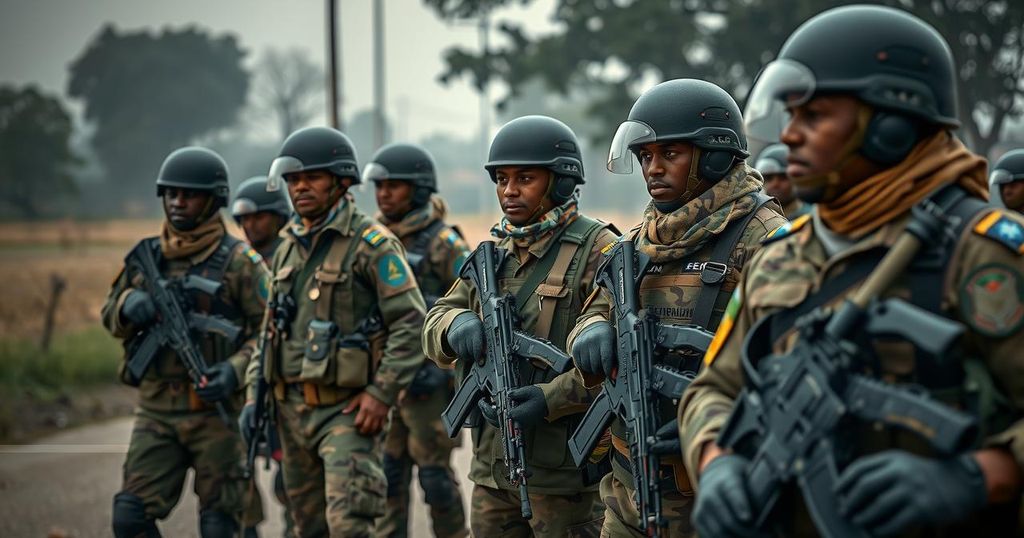Detention of SNA Soldiers by Ethiopian Forces Highlights Jubaland-Electoral Tensions

Ethiopian forces have detained six soldiers believed to be part of the Somali National Army at an airport in Dolow, Somalia. Their arrest is speculated to be related to ongoing tensions regarding the electoral process in Jubaland, with Jubaland pursuing indirect elections against the wishes of the Somali federal government. This incident occurs amid increasing security measures in Jubaland and a notable shift in Ethiopian support towards the region.
Ethiopian forces detained six individuals believed to be Somali National Army (SNA) soldiers at Dolow airport in the Gedo region of Somalia, shortly after their arrival from the capital, Mogadishu. The soldiers were reportedly dressed in civilian clothing, and the reasons for their detention remain ambiguous. This development is seen within the context of allegations that the Somali government is attempting to obstruct the upcoming indirect elections scheduled in Kismayo, the interim capital of Jubaland. The situation escalated after Jubaland authorities bolstered security at Kismayo Airport due to accusations that Somali President Hassan Sheikh Mohamud planned to send elite forces to influence the election process. Despite President Mohamud’s insistence on a universal suffrage election model, Jubaland, led by Ahmed Madobe, is committed to pursuing its indirect elections, arguing that the proposed changes could undermine term limits and lead to illegal extensions of power. In response, Jubaland has initiated the process of selecting lawmakers who will subsequently elect a regional president. Moreover, Ethiopian support for Jubaland has notably increased after a history of strained relations resulting from disagreements with the Somali central government in Mogadishu. Concurrently, Somalia has asserted its intent for Ethiopian troops, currently part of the African Union Transition Mission in Somalia (ATMIS), to withdraw by December 2024, following Ethiopia’s controversial agreement with Somaliland regarding maritime access. Currently, over 4,500 Ethiopian troops are stationed across Somalia, alongside an additional 1,000 non-ATMIS forces, engaged in combat against Al-Shabaab militants. Somalia has voiced its opposition to the ongoing presence of Ethiopian forces, instead advocating for Egypt to lead future stabilizing missions in Somalia.
The political landscape in Somalia is characterized by continual tensions between the federal government and regional states, particularly Jubaland. The struggle for election processes reflects broader disputes regarding governance and authority in the country. Ethiopian troops have historically played a significant role in Somalia’s security context, particularly in combating terrorism and maintaining peace through the AU-backed ATMIS mission. However, their presence has also sparked controversy, particularly as federal government preferences for electoral processes diverge from those of regional authorities. Jubaland’s push for indirect elections stands in stark contrast with the Somali government’s objectives, raising questions about federal authority and regional autonomy. The background of this conflict is crucial for understanding the implications of Ethiopia’s involvement and the reactions of both the federal and Jubaland governments.
The detention of alleged SNA soldiers by Ethiopian forces at Dolow airport highlights the ongoing tensions surrounding the electoral process in Jubaland, which is opposed by the federal government of Somalia. As Jubaland moves forward with its electoral agenda, the regional dynamics are complicated by Ethiopia’s shifting support and Somalia’s demands for the withdrawal of Ethiopian troops from its territory. The broader conflict signals a critical juncture for governance in Somalia, revealing the intersecting issues of security, regional autonomy, and the future of electoral integrity in the face of federal intervention.
Original Source: www.garoweonline.com








